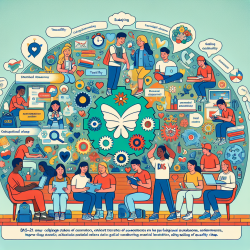Introduction
As technology continues to evolve, its potential to impact healthcare, especially in low- and middle-income countries (LMIC), becomes increasingly evident. A recent pilot study explored the feasibility and acceptability of using mobile technology, specifically the WhatsApp platform, to deliver mental health support and enhance treatment adherence among adolescents living with HIV (ALWH) in Western Kenya. This blog delves into the study's findings and discusses how practitioners can leverage these insights to improve outcomes for adolescents.
The Study: A Brief Overview
The study involved 30 adolescents aged 10-19, all of whom were on antiretroviral therapy (ART) and aware of their HIV status. Participants were divided into two WhatsApp groups based on age and engaged in structured discussions facilitated by a trained counselor. Over six months, the study assessed treatment adherence, stigma, and mental health, with participants expressing positive experiences and a desire for the intervention's expansion.
Key Findings and Implications
- Peer Support and Community Building: Participants valued the sense of community and support the WhatsApp groups provided, which they had previously lacked. This peer network allowed them to share experiences and discuss challenges unique to ALWH.
- Stigma and Mental Health: The intervention highlighted the importance of addressing stigma and mental health issues. Participants reported increased awareness of stigma and mental health literacy, underscoring the need for ongoing education and support.
- Adherence to Treatment: The study found that peer support and counseling positively impacted medication adherence. Participants appreciated reminders and encouragement from peers, which helped them stay on track with their treatment.
Practical Applications for Practitioners
Practitioners can draw several lessons from this study to enhance their practice:
- Leverage Mobile Technology: Embrace mobile platforms like WhatsApp to provide accessible mental health support and foster peer networks among adolescents.
- Address Stigma: Incorporate discussions on stigma and mental health into regular counseling sessions to increase awareness and reduce barriers to treatment adherence.
- Encourage Peer Support: Facilitate peer support groups to create a sense of community and shared experience, which can enhance treatment adherence and mental well-being.
Conclusion
This pilot study demonstrates the potential of mobile interventions to improve mental health and adherence among ALWH in LMIC. By leveraging technology, practitioners can create supportive environments that address the unique challenges faced by adolescents. For more detailed insights, I encourage practitioners to read the original research paper, A Pilot Study of a Mobile Intervention to Support Mental Health and Adherence Among Adolescents Living with HIV in Western Kenya.










